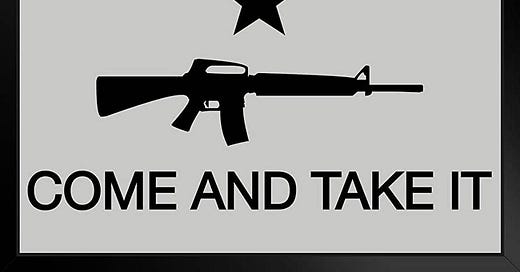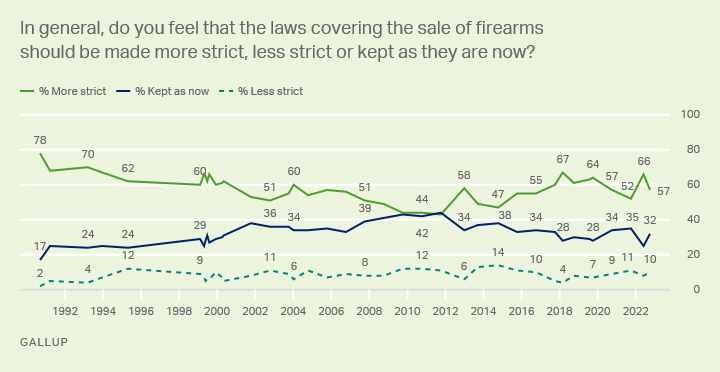In my last post, I referenced the hypocrisy of those who claim to be pro-life but vociferously oppose mask mandates. The same applies to restrictions on guns.
According to polling by Gallup, a majority of Americans believe our gun laws should be stricter. Support for universal background checks, waiting periods, raising the legal age to 21, and restrictions on ownership for dangerous individuals all exceed 70% support. And yet, support among Republicans for new restrictions on guns is below 25%. Interestingly, about the same proportion of Republicans that oppose new gun restrictions consider themselves pro-life. Why is it that the party which is most interested in regulating abortion in order to protect the unborn, is also the least interested in regulating guns in order to protect the born? How is “pro-life and pro-gun” an unironic campaign slogan? And is there not at least some contradiction between the pro-police “back the blue” ethos and policies that ensure citizens can be packing serious heat anytime, anywhere?
My intent here is not to demonize gun-owners. Having lived my whole life in Texas, I know lots of people – including family members - who own and collect guns, enjoy hunting and target practice, and take proper gun safety and storage seriously. Guns have never really been my thing, but I’ve shot them, carried them for self-defense on rural land where feral hogs live, and understand they can serve a legitimate purpose for law-abiding, responsible citizens.
But we’re not alone in having these purposes for guns. We are alone in the ubiquity of guns, however, with the highest ownership per capita in the world (twice as many as Yemen!). We are also alone in the rate of gun violence against a particularly innocent population: children. The U.S. is the only developed nation where firearms are the leading cause of child and teen mortality and has by far the highest number of school shootings of any country in the world.
Now, statistically, your children are almost certainly not going to die in a school shooting or even experience one first-hand. But they likely will experience active shooter drills, and fear going to school after a shooting as I have felt dropping my child off. This is a psychological burden that our children must bear, which those in other developed countries do not. We are not the only nation with disturbed or violent individuals. We are one of very few which makes it easy for such people to purchase semi-automatic, large magazine assault rifles at the age of 18 - weapons designed to deliver high-caliber, extremely deadly firepower efficiently and accurately. It’s no wonder they were the weapon of choice in some of the deadliest mass shootings in the U.S., including the school shootings in Parkland, Sandy Hook and Uvalde.
What is it about our culture that considers AR-15 rifles something to be flaunted on bumper stickers and Christmas cards but not kept out of the hands of immature teenagers or the mentally ill? Why is it that after each new tragedy, half of our politicians immediately retreat into tired arguments about arming teachers, hardening schools, giving kids bulletproof backpacks, and focusing on mental health? Some of these may be good ideas, but why do so many in this country consider the right to own weapons suited to mass murder so fundamental as to not even be questioned in the face of such horrors?
Oh right, the Second Amendment. But that’s not as good an answer as many make it seem. The plain text provides context into the founders’ intent: “a well regulated Militia, being necessary to the security of a free State, the right of the people to keep and bear Arms, shall not be infringed.” Constitutional scholars and courts have disagreed about whether the Second Amendment grants an individual right to bear arms, but the original justification was clearly the need to raise a militia to defend the state. Arguably, the Second Amendment became irrelevant once the U.S. stopped depending on armed private citizens for national defense and raised a professional army. Even if you believe this is about arming citizens against their own government should it exceed its authority, that has pretty clearly not been the historical understanding or we wouldn’t restrict bombs, rocket launchers, and other weapons that are only available to the state (for obvious reasons). So, while legal scholars may argue about what the Second Amendment technically means, it strikes me as highly unlikely that the founders intended for it to enshrine your inalienable right to collect dangerous weapons because you think they’re cool or fun. They didn’t even mention hunting or self-defense in the language of the amendment, two practical uses which certainly existed at the time.
Of course, there are practical arguments against gun control. Restrictions passed now in a nation already swimming in more guns than people may only make a difference at the margins. American gun culture is so ingrained that attempts to ban or buy back certain guns will never go anywhere. Any impediments to unstable kids buying guns would be welcome, but someone set on committing violence will likely still be able to find the means. Etc.
It’s also reasonable to consider what evidence we have that restrictions work. The Rand corporation did a meta-analysis of studies and found inconclusive evidence of restrictions reducing the rate of mass shootings. That said, mass shootings are a rare enough phenomenon that they are very difficult to study with high statistical rigor, so the absence of evidence is not evidence of an absence – it just means there’s a lot of variables and uncertainty in what might work. Australia had 13 mass shootings in 15 years until they introduced significant new regulations on guns, including bans and buy-backs on certain weapons, and then went 21 years without another. That’s not incontrovertible evidence, but it is evidence.
Yet while arguments over efficacy matter, they don’t really get to my main point. Even if we aren’t sure what specific policies will stop the next Uvalde, why is imposing reasonable, broadly supported restrictions on gun ownership not an obviously acceptable tradeoff for the chance to save lives, especially those of our most innocent? When the stakes are life-and-death, we shouldn’t need guarantees of success before we’re willing to try things. Not to mention the fact that mass shootings, while the most indiscriminate and shocking type of gun death, are by no means the leading cause. As Matt Yglesias unpacked recently, the sheer volume of handguns in the U.S. and lax enforcement of existing laws is clearly a factor in the overall rate of gun deaths. Increased impediments to gun ownership will likely reduce all forms of gun deaths, including suicide. Guns don’t make people attempt murder or suicide, but attempts tend to be more successful when guns are used. And that Rand analysis I referenced earlier did find a number of policies which had an effect on gun violence generally. In particular: stand your ground, concealed carry and child-access laws. There are many examples.
As I said earlier, I do believe there are legitimate reasons for law-abiding people to own guns, including recreation. And gun control advocates often forget that gun control policies often end up harming the urban poor (especially Black Americans) who live in dangerous communities and have a legitimate need for personal protection against criminals who will acquire guns illegally if necessary. My only ask is that we question our hierarchy of values when we support measures such as “constitutional carry” or oppose adding common-sense hurdles such as a minimum age for gun purchases that isn’t lower than the legal drinking age, limits on magazine capacity or quantity of ammunition purchases, waiting limits, universal background checks, and red flag laws. Such restrictions are rational ways to protect the right of law-abiding citizens to buy guns for legitimate use while making it more difficult for dangerous or unwell individuals to easily acquire the most effective tools for murder and suicide. It’s fine to argue about the potential effectiveness of different approaches, or how to strike this balance. But checking out of the conversation shows an unwillingness to value life above a misunderstood right that is not and never has been unconditional.





